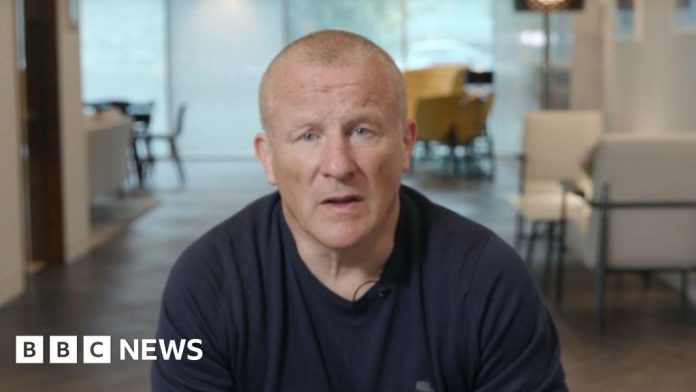Business reporter, BBC News
 PA
PAFormer star fund manager Neil Woodford and his investment firm have been fined a total of almost £46m by the financial watchdog.
Some 300,000 people lost out when Woodford Equity Income Fund collapsed in 2019 after investors tried to withdraw money faster than the fund could pay out.
The Financial Conduct Authority (FCA) has provisionally fined Mr Woodford nearly £6m and banned him from holding senior manager roles and managing funds for non-professional investors. It has fined his fund, Woodford Investment Management (WIM), £40m.
WIM said it “strongly” disagreed with the FCA’s decision to take action and it intended to appeal, meaning that all the FCA’s findings are still provisional.
Once a high-flying city fund manager, Mr Woodford was variously described as the man who made middle England rich and the UK’s answer to Warren Buffet.
He made his name at the fund management giant Invesco Perpetual, before leaving in 2013 to set up his own company.
He was as close to a household name as is possible in the world of investing and people piled into his flagship UK Equity Income Fund. At its peak, it had £10bn of people’s money in it.
The Woodford Equity Income Fund (WEIF) was managed by Mr Woodford and WIM, but was suspended in June 2019 meaning investors, most of whom were ordinary retail investors, were unable to get hold of their money.
The fund had fallen in value from a high of £10.1bn in May 2017 to £3.6bn in the run-up to its suspension.
The FCA said between July 2018 and June 2019 WIM and Mr Woodford made “unreasonable and inappropriate investment decisions”.
The watchdog said they had sold off liquid investments, which were easier to sell, and bought ones that were harder to sell.
As a result, at the time the company was suspended only 8% of the investments could be sold within seven days – investors should have been able to get their money within four days.
According to the FCA, WIM and Mr Woodford “did not react appropriately as the fund’s value declined, its liquidity worsened and more investors withdrew their money”.
“This disadvantaged investors who remained in the fund, compared to those who had withdrawn their investment before the fund was suspended.”
Steve Smart, joint executive director of enforcement and market oversight at the FCA, said: “Being a leader in financial services comes with responsibilities as well as profile. Mr Woodford simply doesn’t accept he had any role in managing the liquidity of the fund.
“The very minimum investors should expect is those managing their money make sensible decisions and take their senior role seriously.
“Neither Neil Woodford nor Woodford Investment Management did so, putting at risk the money people had entrusted them with.”
In a statement, WIM said Mr Woodford had managed the WEIF in accordance with a liquidity framework laid down by Link Fund Solutions (LFS), the separate company in charge of the fund’s liquidity.
It said this framework was “fully visible to the FCA, who had never objected to it”.
“There was never an indication that the FCA considered the management of the fund’s liquidity to be inappropriate or unreasonable,” WIM added.
The “true cause of the investor losses”, said WIM, was Link’s decision to liquidate the fund in October 2019, four months after it had been suspended.
During the suspension period, Mr Woodford had been “actively restructuring” the fund and come up with a plan which “could have supported a managed reopening of the fund”, the statement continued.
In October 2023 the Waystone Group, acquired the Irish and UK businesses of LFS. Waystone has been approached for comment.
In April 2024, the FCA found that LFS had “failed to act with due skill, care and diligence” in its management of the WEIF.
Both WIM and Mr Woodford said they had “great sympathy for their investors who were impacted by the suspension, and who suffered financial loss when the Fund was liquidated”.
“However, they continue to believe that any loss suffered was avoidable and was a product of bad decisions made by Link after the suspension, which were overseen by the regulator.”


